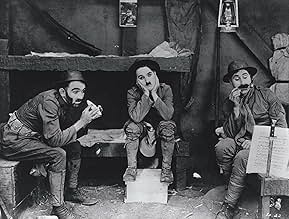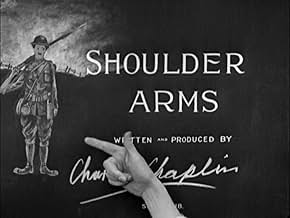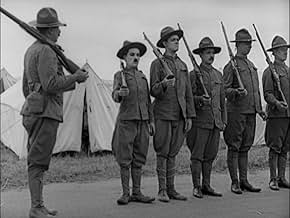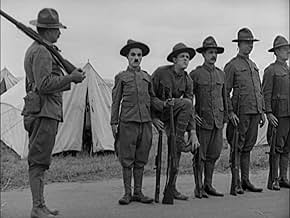IMDb RATING
7.3/10
7.8K
YOUR RATING
Charlie is a boot camp private who has a dream of being a hero who goes on a daring mission behind enemy lines.Charlie is a boot camp private who has a dream of being a hero who goes on a daring mission behind enemy lines.Charlie is a boot camp private who has a dream of being a hero who goes on a daring mission behind enemy lines.
Charles Chaplin
- Doughboy
- (as Charlie Chaplin)
Syd Chaplin
- Charlie's Comrade
- (as Sydney Chaplin)
- …
W.J. Allen
- Motorcyclist
- (uncredited)
L.A. Blaisdell
- Motorcyclist
- (uncredited)
Alva D. Blake
- U.S. Soldier
- (uncredited)
- …
Cliff Brouwer
- Soldier
- (uncredited)
E. Brucker
- Bit Part in Street Scene
- (uncredited)
F.S. Colby
- Soldier
- (uncredited)
Wellington Cross
- Motorcyclist
- (uncredited)
E.H. Devere
- Bit Part in Street Scene
- (uncredited)
C.L. Dice
- Motorcyclist
- (uncredited)
- Director
- Writer
- All cast & crew
- Production, box office & more at IMDbPro
Featured reviews
Charlie is a boot camp private who has a dream of being a hero who goes on a daring mission behind enemy lines.
"Shoulder Arms" proved to be Chaplin's most popular film, critically and commercially, up to that point. This is understandable given the interesting themes and visual gags. The tree is pretty funny, and the underwater sleeping arrangements are amusing.
What I find particularly interesting about this film's success is how it seems to be now more or less forgotten. I mean, of course any Chaplin film or silent comedy fan will know it. But compared to "The Kid" or "Modern Times" or "City Lights", it is far removed... is this now even one of the top ten most popular Chaplin films?
"Shoulder Arms" proved to be Chaplin's most popular film, critically and commercially, up to that point. This is understandable given the interesting themes and visual gags. The tree is pretty funny, and the underwater sleeping arrangements are amusing.
What I find particularly interesting about this film's success is how it seems to be now more or less forgotten. I mean, of course any Chaplin film or silent comedy fan will know it. But compared to "The Kid" or "Modern Times" or "City Lights", it is far removed... is this now even one of the top ten most popular Chaplin films?
It's a comedy about the trench warfare just as WWI is about to come to an end. Charlie Chaplin is a doughboy in boot camp. In a series of scenes, he defeats many Germans. Then he wakes up.
It's a pretty long film at 45 minutes. There are some pretty funny scenes. The limburger cheese gag is somewhat weak. Capturing the 13 Germans could have used more slapstick. I do love the part where he's in enemy territories disguised as a tree. The Germans try to chop him down for firewood. That is by far my favorite part. The movie's success probably had a lot to do with the timing and the subject. However I can see the immense risk Chaplin was taking by making a comedy about trench warfare.
It's a pretty long film at 45 minutes. There are some pretty funny scenes. The limburger cheese gag is somewhat weak. Capturing the 13 Germans could have used more slapstick. I do love the part where he's in enemy territories disguised as a tree. The Germans try to chop him down for firewood. That is by far my favorite part. The movie's success probably had a lot to do with the timing and the subject. However I can see the immense risk Chaplin was taking by making a comedy about trench warfare.
One of the prices of superstardom is that you have to become adaptable. When the US joined the World War in 1917 Charlie Chaplin was at the height of his popularity. Naturally, he was expected to make some sort of contribution. Chaplin had already set his short films in all sorts of locations, even at different time periods, and had given his little tramp all manner of occupations, so soldiering in the trenches shouldn't have been too big a step. However, Shoulder Arms is, if not a propaganda piece (it was released a bit late for that), at least one that had to have a certain outlook. As a result Chaplin was constrained somewhat, and it shows.
The first half of the picture, which is set during Charlie's training and among his comrades in the trench seems a little muted compared to other Chaplin pictures of this period. The reason for this is clear – it wouldn't have had the right effect if there were seen to be too much antagonism between soldiers. Characters like the burly drill sergeant or Charlie's buddy (played his brother Syd) would make ideal bugbears in any other picture, but here all we get is a bit of appropriately brotherly tussling between Charlie and Syd. When you see how weak these opening ten minutes are you realise how much of Chaplin's comedy depended upon playing off others and pricking pomposity.
Fortunately, Chaplin gets to make up for all this when his little tramp goes out to face the German foe. Here he can go all out with making his enemies look ridiculous, getting the most out of his varyingly-sized supporting players. We have Henry Bergman as a roly-poly German, Albert Austin as a gangly one, and best of all Loyal Underwood as a short but self-important German officer. This is Underwood's finest moment, and he really puts a lot of energy and spirit into the part. And Chaplin gets to set up some great routines, with some ingenious ways of defeating foes, not to mention one of his best ever entrances when he appears out of the landscape in his tree disguise.
And Chaplin was clearly savvy enough to realise that the beginning of the picture contained some fairly poor material. Consequently he edits in a handful of shots of antics in the German trench (with Underwood at his most animated), which serve as nothing more than a little touch of uproar, and a promise of things to come.
And now we must have that all-important statistic – Number of kicks up the arse: 7 (1 for, 0 against, 6 other)
The first half of the picture, which is set during Charlie's training and among his comrades in the trench seems a little muted compared to other Chaplin pictures of this period. The reason for this is clear – it wouldn't have had the right effect if there were seen to be too much antagonism between soldiers. Characters like the burly drill sergeant or Charlie's buddy (played his brother Syd) would make ideal bugbears in any other picture, but here all we get is a bit of appropriately brotherly tussling between Charlie and Syd. When you see how weak these opening ten minutes are you realise how much of Chaplin's comedy depended upon playing off others and pricking pomposity.
Fortunately, Chaplin gets to make up for all this when his little tramp goes out to face the German foe. Here he can go all out with making his enemies look ridiculous, getting the most out of his varyingly-sized supporting players. We have Henry Bergman as a roly-poly German, Albert Austin as a gangly one, and best of all Loyal Underwood as a short but self-important German officer. This is Underwood's finest moment, and he really puts a lot of energy and spirit into the part. And Chaplin gets to set up some great routines, with some ingenious ways of defeating foes, not to mention one of his best ever entrances when he appears out of the landscape in his tree disguise.
And Chaplin was clearly savvy enough to realise that the beginning of the picture contained some fairly poor material. Consequently he edits in a handful of shots of antics in the German trench (with Underwood at his most animated), which serve as nothing more than a little touch of uproar, and a promise of things to come.
And now we must have that all-important statistic – Number of kicks up the arse: 7 (1 for, 0 against, 6 other)
In these modern times (as subject known quite well to the director of the short film that this German count is going to talk about
), politically correct films are the "leitmotiv" of the modern young filmmakers' projects. "Shoulder Arms" directed by Herr Charlie Chaplin during WWI (the film was released only a few weeks before the armistice) is an obvious example of why the early cinema pioneers were a very bold people, certainly! To direct a humorous film inspired in the terrible, bloody First World War was a complicated matter that only few directors with those dangerous and daring ideas could be allowed to do
to venture upon such delicate enterprise and with success was reserved only to geniuses.
As this German count said, "Shoulder Arms" was made during WWI, that time in where definitely the whole world lost its innocence (fortunately not the German fat heiresses of this aristocrat ) and it is a hilarious, inventive social satire about that and any war. The film it is full of great gags and entertaining film continuity for a story in where that tramp will live though risky and courageous adventures in the front whether a hero for the allies or not.
To mock the war trenches, the unhealthiness, the frontal attacks and the Germans (how you dare!!... by the way, there are a lot of inaccuracies in the film the German soldiers by that time had moustaches and longer beards not to mention that the Kaiser lacks many medals in his uniform ) in an elegant, funny and delicate way it is even today a film miracle impossible of being surpassed. Keeping in mind those terrible wartime circumstances, the difficult task is only possible thanks to a lot of creativity and talent. Obviously Herr Charlie Chaplin had very much of it.
And now, if you'll allow me, I must temporarily take my leave because this German Count must go back to the Schloss trenches.
Herr Graf Ferdinand Von Galitzien http://ferdinandvongalitzien.blogspot.com/
As this German count said, "Shoulder Arms" was made during WWI, that time in where definitely the whole world lost its innocence (fortunately not the German fat heiresses of this aristocrat ) and it is a hilarious, inventive social satire about that and any war. The film it is full of great gags and entertaining film continuity for a story in where that tramp will live though risky and courageous adventures in the front whether a hero for the allies or not.
To mock the war trenches, the unhealthiness, the frontal attacks and the Germans (how you dare!!... by the way, there are a lot of inaccuracies in the film the German soldiers by that time had moustaches and longer beards not to mention that the Kaiser lacks many medals in his uniform ) in an elegant, funny and delicate way it is even today a film miracle impossible of being surpassed. Keeping in mind those terrible wartime circumstances, the difficult task is only possible thanks to a lot of creativity and talent. Obviously Herr Charlie Chaplin had very much of it.
And now, if you'll allow me, I must temporarily take my leave because this German Count must go back to the Schloss trenches.
Herr Graf Ferdinand Von Galitzien http://ferdinandvongalitzien.blogspot.com/
Charlie Chaplin wins the war single handedly in this funny amusing film. This was one of Chaplins most successful films and is easy to see why. Made at a time when people needed a diversion from one the most terrifying wars ever Chaplin fins a light hearted way to make people feel good for a while.
The film starts with him having some funny problems in boot camp when he falls a sleep he finds himself being deployed to to trenches of France and immediately has problems manicuring inside the trench, He finally goes over the top rescues a friend, falls in love with a french lady, and then captures the Kaiser.
It is all rather light hearted and very amusing a good film to see
The film starts with him having some funny problems in boot camp when he falls a sleep he finds himself being deployed to to trenches of France and immediately has problems manicuring inside the trench, He finally goes over the top rescues a friend, falls in love with a french lady, and then captures the Kaiser.
It is all rather light hearted and very amusing a good film to see
Did you know
- TriviaMany in Hollywood were nervous that one of their most famous peers was going to tackle the subject of WWI. It was released shortly before the Armistice, so it did not help boost national morale, but it did end up as one of Charles Chaplin's most popular films, and it was particularly popular with returning doughboys.
- GoofsIn the woods, where The Doughboy runs to hide from the pursuing Germans, automobiles are visible traveling on a highway on the horizon.
- Crazy creditsThe short opens with a title card showing a caricature of Chaplin dressed as a World War I soldier, and text reading "Shoulder Arms Written and Produced by" followed by a blank space. A live action hand appears and points to the title, then the drawing, then uses a piece of white chalk to sign "Charles Chaplin" in the blank space, then points to the caricature one more time.
- ConnectionsEdited into The Chaplin Revue (1959)
Details
- Release date
- Country of origin
- Official sites
- Languages
- Also known as
- Shoulder Arms
- Filming locations
- 7th Street and Broadway, Downtown, Los Angeles, California, USA(traffic cop trouble in front of Bullock's Department Store.)
- Production company
- See more company credits at IMDbPro
- Runtime36 minutes
- Color
- Sound mix
- Aspect ratio
- 1.33 : 1
Contribute to this page
Suggest an edit or add missing content




























